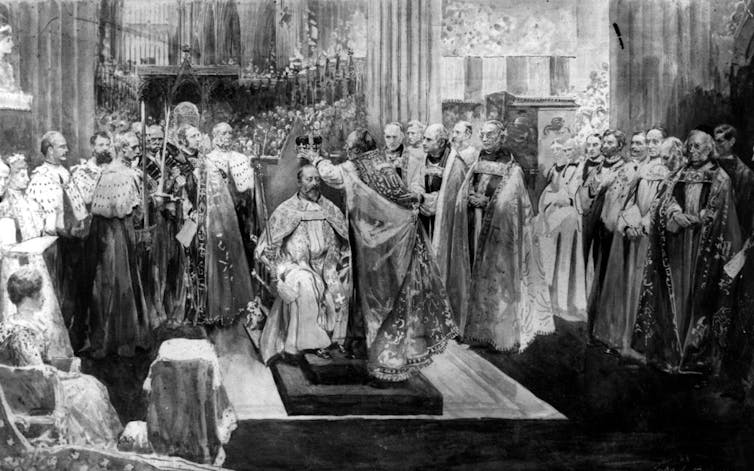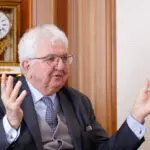Graduations throughout the United States erupt with some familiar sounds every year: the passionate cheering of friends and families, the lofty grandeur of speeches and, of course, one very recognizable tune.
Most Americans – if they’re even aware of its name – know it simply as “Pomp and Circumstance.”
More specifically, it is the “trio” section of the most famous of Edward Elgar’s five Pomp and Circumstance marches, “March No. 1 in D Major.”
When Elgar composed the piece in 1901, he wasn’t thinking about graduation or scholarship. He wrote it as a patriotic military march.
The phrase “pomp and circumstance” originates in Shakespeare’s “Othello,” where Othello uses it as he speaks of the allure of the “spirit-stirring drum” of “glorious war.”
In Britain, the melody still evokes the confident grandeur of an empire at its peak – just years before World War I shattered that confidence. The tune soon acquired a different set of associations in America, where by the 1920s it had become a graduation staple.
The unbridled optimism of empire
For a British military march to be reinvented as a graduation tune – by a former colonial subject of the U.K., no less – shows how people can bestow entirely new meanings onto old songs.
Elgar had already achieved acclaim in the 1890s for works such as “The Black Knight” and “King Olaf.” By the time of Queen Victoria’s death in 1901, Elgar was, according to biographer Basil Maine, the greatest musician of the land.
The premiere of “March No. 1” elevated him into an even greater stratosphere of fame. Music critics and the public considered it one of Elgar’s best for its stately, soaring majesty.
The new king of Britain, Edward VII, was among those who lavished praise on the tune, and he persuaded Elgar to incorporate it into a significantly longer ode that Elgar composed for the king’s coronation.

Essayist and critic A.C. Benson wrote lyrics for the performance of Elgar’s melody at the coronation, resulting in the patriotic anthem “Land of Hope and Glory.”
British audiences are most familiar with this form of “March No. 1.” Along with “Jerusalem” and “I Vow to Thee, My Country,” “Land of Hope and Glory” is one of the most famous British patriotic songs outside of the national anthem. The Proms, a series of popular summer concerts in Britain that began in 1895, traditionally feature “Land of Hope and Glory” during the final concert of the year.
Perhaps no piece of music better fits the mood of Britain before World War I. As a scholar of this era, I cannot help but notice the unbridled boldness of the piece, the sonorous confidence that Britain is and always will be the most powerful, influential country in the world.
This stability, of course, would not last. The devastation of World War I shattered this fantasy and signaled the start of its declining importance in world affairs. Several decades later, World War II and its aftermath led to the rapid dissolution of the British Empire.
Now, in the 21st century, the tune evokes the nostalgia for a vanished, golden age. But the lyrics of “Land of Hope and Glory” have also generated controversy for their encouragement of imperialism and expansionism – “wider still and wider shall her bounds be set.”
A send-off fit for a king
Unlike British audiences, Americans didn’t associate the song with an imperial past; for over a century, they’ve used it to celebrate the future.
The tune’s tie to graduation began in 1905, when Elgar received an honorary doctorate at Yale. At the end of the ceremony, the school orchestra played “March No. 1” in order to honor him.
This started a trend among prestigious universities. Princeton first played the song in 1907, followed by the University of Chicago in 1908 and Columbia in 1913.
The song spread organically, owing to the increasing interconnectedness of the nation. Because of railroads, telegraphs and advances in printing technology, news and people could travel quickly.
In less than 20 years, “March No. 1” went from an Ivy League novelty to a widely embraced musical standard for high school and college graduations.
Why did it catch on so quickly? I’d say its mix of optimism and grandeur – with a hint of wistfulness – resonated.
It’s an appropriate send-off for a student entering a new stage of life – one fit for a king.

Joshua Fagan does not work for, consult, own shares in or receive funding from any company or organization that would benefit from this article, and has disclosed no relevant affiliations beyond their academic appointment.
Source: The Conversation

 Fed's Kashkari says broad-based US deportations could disrupt labor for some businesses
Fed's Kashkari says broad-based US deportations could disrupt labor for some businesses
 'Heretic' and Hugh Grant debut with $11 million, but 'Venom: The Last Dance' tops box office again
'Heretic' and Hugh Grant debut with $11 million, but 'Venom: The Last Dance' tops box office again
 Veterans face challenges starting small businesses but there are plenty of resources to help
Veterans face challenges starting small businesses but there are plenty of resources to help
 Trump in phone call advised Putin not to escalate in Ukraine - Washington Post
Trump in phone call advised Putin not to escalate in Ukraine - Washington Post
 The Taliban will attend a UN climate conference for the 1st time
The Taliban will attend a UN climate conference for the 1st time
 No reason not to cut rates in Dec as of now, ECB's Holzmann tells paper
No reason not to cut rates in Dec as of now, ECB's Holzmann tells paper
 Judith Jamison, influential dancer and choreographer, dies at 81
Judith Jamison, influential dancer and choreographer, dies at 81
 Wimbledon champion Barbora Krejcikova calls out Tennis Channel's Jon Wertheim
Wimbledon champion Barbora Krejcikova calls out Tennis Channel's Jon Wertheim
 Ian Botham saved by Ashes rival from crocodile infested waters after fishing mishap
Ian Botham saved by Ashes rival from crocodile infested waters after fishing mishap
 Graduates toss their caps into the air at the conclusion of the 2022 Dana Hills High School graduation ceremony in Dana Hills, Calif.
Graduates toss their caps into the air at the conclusion of the 2022 Dana Hills High School graduation ceremony in Dana Hills, Calif.
